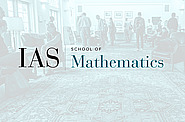Seminars Sorted by Series
Computer Science/Discrete Mathematics Seminar II
Oct
03
2006
Computer Science/Discrete Mathematics Seminar II
A Randomized Polynomial-Time Simplex Algorithm for Linear Programming
10:30am|S-101
Oct
10
2006
Computer Science/Discrete Mathematics Seminar II
An Invitation to Combinatorial Games
10:30am|West Building Lecture Theatre
Oct
17
2006
Oct
31
2006
Computer Science/Discrete Mathematics Seminar II
2-Source Dispersers for Sub-Polynomial Min-Entropy and Ramsey Graphs Beating the Frankl Wilson Construction
10:30am|S-101
Nov
07
2006
Computer Science/Discrete Mathematics Seminar II
Solvability of Polynomial Equations over Finite Fields
10:30am|S-101
Nov
14
2006
Computer Science/Discrete Mathematics Seminar II
Cut Problems in Graphs: Algorithms and Complexity
10:30am|S-101
Nov
28
2006
Computer Science/Discrete Mathematics Seminar II
New Correlation Bounds for GF(2) Polynomials Using the Gowers Norm
10:30am|S-101
Dec
05
2006
Computer Science/Discrete Mathematics Seminar II
On the Correlation Between Parity and Modular Polynomials
10:30am|S-101
Dec
12
2006
Computer Science/Discrete Mathematics Seminar II
Cycles and Cliques Minors in Expanders
Benny Sudakov
10:30am|S-101
Dec
19
2006
Computer Science/Discrete Mathematics Seminar II
Sum-Product Estimates, Expanders, and Sieving
Alex Gamburd
10:30am|S-101
Jan
16
2007
Computer Science/Discrete Mathematics Seminar II
An Elementary Construction of Constant-Degree Expanders
Oded Schwartz
10:30am|S-101
Jan
23
2007
Computer Science/Discrete Mathematics Seminar II
The Polynomial Identity Testing Problem
10:30am|West Building Lecture Theatre
Jan
30
2007
Computer Science/Discrete Mathematics Seminar II
On Approximate Majority and Probabilistic Time
10:30am|S-101
Feb
06
2007
Feb
13
2007
Computer Science/Discrete Mathematics Seminar II
Fast Johnson-Lindenstrauss Transform(s)
10:30am|S-101
Feb
20
2007
Feb
27
2007
Mar
06
2007
Computer Science/Discrete Mathematics Seminar II
A Product Theorem in Free Groups (Continued)
10:30am|S-101
Mar
13
2007
Computer Science/Discrete Mathematics Seminar II
The Design and Analysis of Simple Algorithms (for Search and Optimization)
11:30am|S-101
Mar
20
2007
Computer Science/Discrete Mathematics Seminar II
The Design and Analysis of Simple Algorithms: Part II
11:30am|S-101
Mar
27
2007
Computer Science/Discrete Mathematics Seminar II
Pseudo-Random Number Generation by Algebraic Means
11:30am|West Building Lecture Theatre
Apr
03
2007
Computer Science/Discrete Mathematics Seminar II
Pseudo-Random Number Generation by Algebraic Means (continued)
10:30am|S-101
Apr
10
2007
Computer Science/Discrete Mathematics Seminar II
Aggregating Inconsistent Information: Ranking and Clustering
10:30am|S-101
Apr
17
2007
Apr
24
2007
Computer Science/Discrete Mathematics Seminar II
Consensus Clustering, Hieraracical Clustering and Phylogeny
10:30am|S-101
May
01
2007
Computer Science/Discrete Mathematics Seminar II
One-Way Multi-Party Communication Lower Bound for Pointer Jumping with Applications
10:30am|S-101
May
08
2007
Computer Science/Discrete Mathematics Seminar II
An Exponential Time/Space Speedup for Resolution
10:30am|S-101
May
17
2007
Computer Science/Discrete Mathematics Seminar II
Proof of the Parallel Repetition Theorem
10:45am|West Building Lecture Theatre, IAS
Sep
25
2007
Computer Science/Discrete Mathematics Seminar II
Hardness of Solving Sparse Overdetermined Linear Systems
10:30am|S-101
Oct
02
2007
Computer Science/Discrete Mathematics Seminar II
Unbounded-Error Communication Complexity of Symmetric Functions
Alexander Sherstov
10:30am|S-101
Oct
09
2007
Computer Science/Discrete Mathematics Seminar II
<a href = "http://www.math.ias.edu/~agarber/RImpagliazzo/abstract.pdf">New Proofs of (New) Direct Product Theorems</a>
10:30am|S-101
Oct
16
2007
Computer Science/Discrete Mathematics Seminar II
Sparse Random Linear Codes are Locally Decodable and Testable
10:30am|S-101
Oct
30
2007
Computer Science/Discrete Mathematics Seminar II
Balancing Gaussian Vectors
Kevin Costello
10:30am|S-101
Nov
06
2007
Computer Science/Discrete Mathematics Seminar II
Locally Decodable Codes from Nice Subsets of Finite Fields and Prime Factors of Mersenne Numbers
10:30am|S-101
Nov
13
2007
Nov
20
2007
Computer Science/Discrete Mathematics Seminar II
Density Theorems for Bipartite Graphs and Related Ramsey-Type Results
Benny Sudakov
10:30am|S-101
Nov
27
2007
Computer Science/Discrete Mathematics Seminar II
The Approximation Complexity of Win-Lose Games
10:30am|West Building Lecture Theatre
Dec
04
2007
Computer Science/Discrete Mathematics Seminar II
Optimal Phylogenetic Reconstruction
Konstantinos Daskalakis
10:30am|S-101
Jan
22
2008
Jan
29
2008
Computer Science/Discrete Mathematics Seminar II
Arithmetic Complexity -- The Power of Partial Derivatives
Avi Wigderson, IAS
10:30am|S-101
Feb
05
2008
Computer Science/Discrete Mathematics Seminar II
Arithmetic Complexity -- The Power of Partial Derivatives
10:30am|S-101
Feb
12
2008
Computer Science/Discrete Mathematics Seminar II
Efficient Algorithms for Some Algebraic Problems
10:30am|S-101
Feb
19
2008
Computer Science/Discrete Mathematics Seminar II
New Results and Open Problems in Computing Nash Equilibria
Christos Papadimitriou
10:30am|S-101
Feb
26
2008
Computer Science/Discrete Mathematics Seminar II
Sound 3-Query PCPPs Are Long
Arie Matsliah
10:30am|S-101
Mar
11
2008
Computer Science/Discrete Mathematics Seminar II
The Sign-Rank of AC^0 (continued)
10:30am|West Bldg. Lecture Hall
